OGDO ransomware infects all your files, makes them inaccessible
Contents
OGDO ransomware is a computer virus which is designed to encrypt your personal files using RSA and demand paying a ransom to provide you with file decryption tools. The virus targets various personal data like videos, photos, documents, and other sensitive information. Encoded files can be easily recognized because the virus adds .ogdo extension at the end of their original filename. Once your system gets infected, a text file called _readme.txt, which includes a ransom note, appears in every folder containing files. The hackers typically request a certain amount ($490-$980) of Bitcoin for you to regain the access to encrypted data. This particular virus variant is the 250th version of STOP/DJVU ransomware and belongs to the updated variants’ list, which means that files locked with online encryption can no longer be restored for free.
This article contains full guidelines of ransomware operation, distribution, and ways to recover encrypted files.

Ransom note contents: test decryption tool and ransom discounts applied
Since the act of encryption is already carried out, the OGDO virus’ algorithm leaves ransom notes in every folder which contains inaccessible data. _readme.txt file usually explains what happened to your personal files and demands for a ransom. You can also find the email addresses by which you could contact the hackers and send the ransom – helpmanager@mail.ch and alternative one restoremanager@airmail.cc.
Cybercriminals might try to lure you into thinking that regaining access to your files is reachable by hand, they might even decode a small portion of information as a proof in order to urge you to pay the ransom. At this point, it is important to realize that no matter what you should not try to attempt the former, since most of the hackers are completely unreliable.
Sending them money might lead to a pointless loss of money, nothing else. To secure yourself from OGDO virus, you need to start browsing the internet more attentively. This means surfing only verified websites, recognizing, and ignoring suspicious emails and links inside of them. Also, you should not download illegal software, cracks, activation keys, etc. as well as stop visiting websites that provide these kinds of services altogether.

Unfortunately, there is no achievable way to decrypt your files, so the best thing you could do is to completely remove OGDO virus from your system and restore at least a portion of the files from a backup (of course, if you have one).
Scan your system for FREE to detect security, hardware and stability issues. You can use the scan results and try to remove threats manually, or you can choose to get the full version of software to fix detected issues and repair virus damage to Windows OS system files automatically. Includes Avira spyware/malware detection & removal engine.
Threat Summary
| Name | OGDO ransomware virus |
| Type | Crypto-malware, File-encrypting virus, File Locker |
| Family | STOP/DJVU |
| Version | 250th |
| Discovered by | Michael Gillespie |
| Other variants | KAAA, BGJS, BGZQ (find full list here) |
| Extension used | .ogdo |
| Symptoms | The virus launches once the victim downloads a software crack, scans the system for target files (documents, photos, videos, archives) and encrypts them, adding a file marker on the way. The virus then drops _readme.txt ransom notes, in which the criminals explain the conditions and ransom price the victim needs to pay in order to access OGDO decryption tool |
| Ransom message | _Readme.txt |
| Contact emails | helpmanager@mail.ch; restoremanager@airmail.cc |
| Amount of the ransom | $490 if paid within 72 hours or $980 later |
| Distribution | Software cracks, malicious domains pushing downloads |
| Decryption | There are a few alternative STOP/DJVU decryption methods that might help to restore locked files. Please check if you were affected with offline key RSA encryption. |
| Removal | RESTORO can be used to repair virus damage and clean malware remains on the system |
Hopes to decrypt files
STOP ransomware variants such as OGDO, BOOP, KASP or GENO all use one of two kinds of encryption when installed on the system. It can be online or offline encryption based on how successful the virus is when trying to connect to computer’s network. In such situation, a poorly working Internet network stages a better situation for the victim, because if the virus fails to connect to the Internet, it uses offline encryption and hardcoded encryption key to lock all files. In this case, it means that all victims of offline encryption can recover their files using a same key. However, it requires someone to pay the ransom and share it with others.
You can check if you were affected by offline encryption by opening C:/SystemID/PersonalID.txt file and checking the end of the uploaded string. If it ends with “t1”, it indicates offline key usage.
In case of online encryption, the virus connects to the Internet network successfully, pings its C&C server and obtains a unique encryption key for the victim. In such scenario, data can be recovered only with data backups, or by paying the ransom (which we do not recommend doing at all).
Distribution methods
Being a crypto-virus, OGDO ransomware tends to spread through various downloadable software tools. Cracks for expensive programs, illegal access keys, Torrent downloads – all these things might lead to a breach in your system’s security. Moreover, this type of ransomware uses certain tricks to disguise its actions. For example, it might conceal itself as a Windows or some type of other software update, in which case, inattentive user might not be able to recognize what is happening on his PC. Also, there were reported cases of this malware’s proliferation through suspicious emails and various pop-ups in websites.
For this reason, we can say, that there is no shortage of ways to be jeopardized by this ransomware. Furthermore, OGDO ransomware use particularly high-end encryption methods, which in certain contexts might even be called as “military grade encryption”. Unfortunately, this fact brings far from good news to the user – retrieval of files without the OGDO decryption key is merely impossible – that would take an enormous amount of time and resources. Moreover, the key itself is created individually for every victim by the cipher algorithm, so trying to obtain one from a different source is simply not an option.
OGDO ransomware removal
To remove OGDO ransomware, we highly recommend you use trustworthy and sufficient malware removal software. Even though there are lots of different options in the market, we suggest using one that would be capable of dealing with such a formidable threat.
Various cybersecurity professionals, as well as ours, recommend downloading RESTORO for such tasks. Since most of the ransomware might try to block the access to security pages or antivirus tools, you will need to boot your computer into Safe Mode before you proceed with OGDO virus removal.
After the removal, you will be safe to restore your personal files from a backup or try alternative methods. A simple and fast guide to remove OGDO ransomware virus is written down below.
OUR GEEKS RECOMMEND
Our team recommends removing malware using a professional antivirus software.
REMOVE THREATS WITH ROBUST ANTIVIRUS

Get INTEGO ANTIVIRUS for Windows to remove ransomware, Trojans, adware and other spyware and malware variants and protect your PC and network drives 24/7. This VB100-certified security software uses state-of-art technology to provide protection against ransomware, Zero-Day attacks and advanced threats, Intego Web Shield blocks dangerous websites, phishing attacks, malicious downloads and installation of potentially unwanted programs.
Use INTEGO Antivirus to remove detected threats from your computer.
GeeksAdvice.com editors select recommended products based on their effectiveness. We may earn a commission from affiliate links, at no additional cost to you. Learn more.
OGDO Ransomware Virus Removal Guidelines
Method 1. Enter Safe Mode with Networking
Step 1. Start Windows in Safe Mode with Networking
Before you try to remove OGDO Ransomware Virus virus, you must start your computer in Safe Mode with Networking. Below, we provide the easiest ways to boot PC in the said mode, but you can find additional ones in this in-depth tutorial on our website – How to Start Windows in Safe Mode. Also, if you prefer a video version of the tutorial, check our guide How to Start Windows in Safe Mode on Youtube.
Instructions for Windows XP/Vista/7 users
- First of all, turn off your PC. Then press the Power button to start it again and instantly start pressing F8 button on your keyboard repeatedly in 1-second intervals. This launches the Advanced Boot Options menu.
- Use arrow keys on the keyboard to navigate down to Safe Mode with Networking option and press Enter.
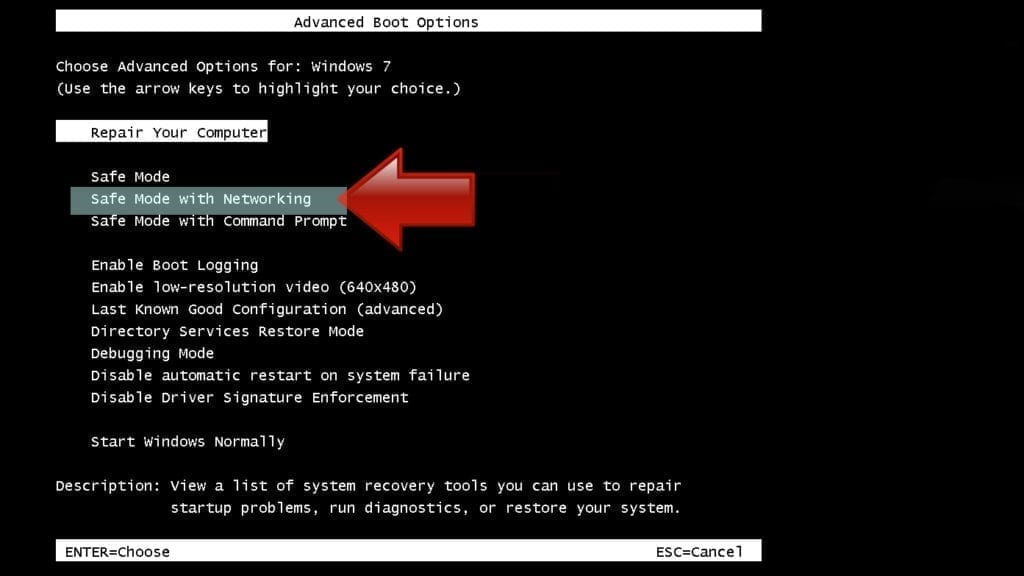
Instructions for Windows 8/8.1/10/11 users
- Open Windows Start menu, then press down the Power button. On your keyboard, press down and hold the Shift key, and then select Restart option.
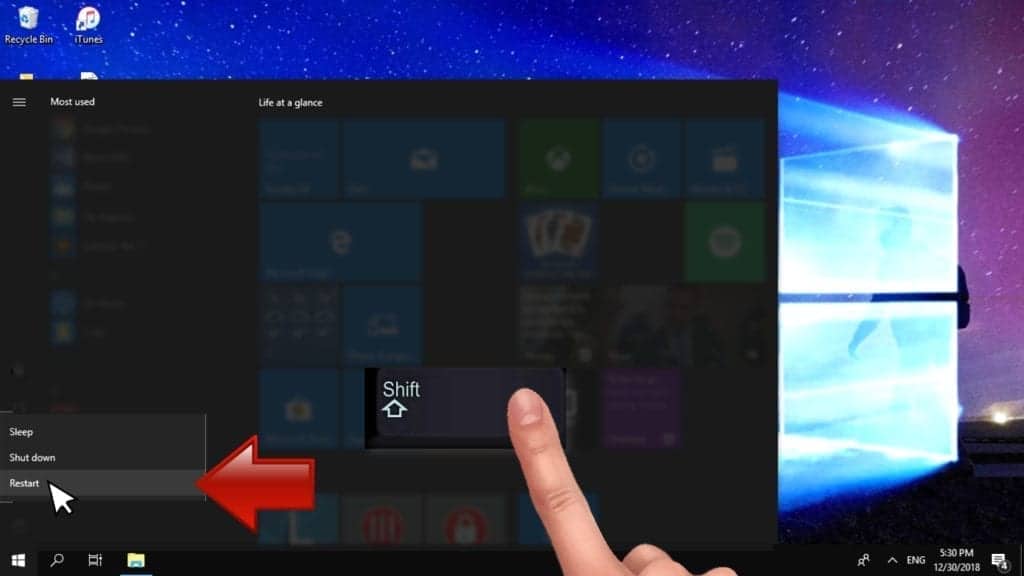
- This will take you to Windows Troubleshoot screen. Choose Troubleshoot > Advanced Options > Startup Settings > Restart. Tip: If you can't find Startup Settings, click See more recovery options.
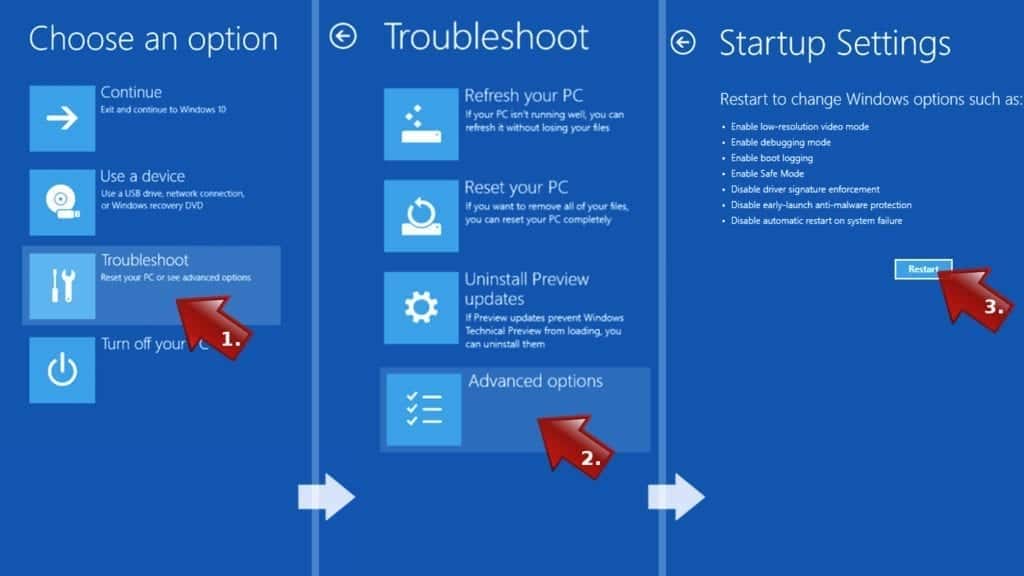
- In Startup Settings, press the right key between F1-F9 to enter Safe Mode with Networking. In this case, it is the F5 key.
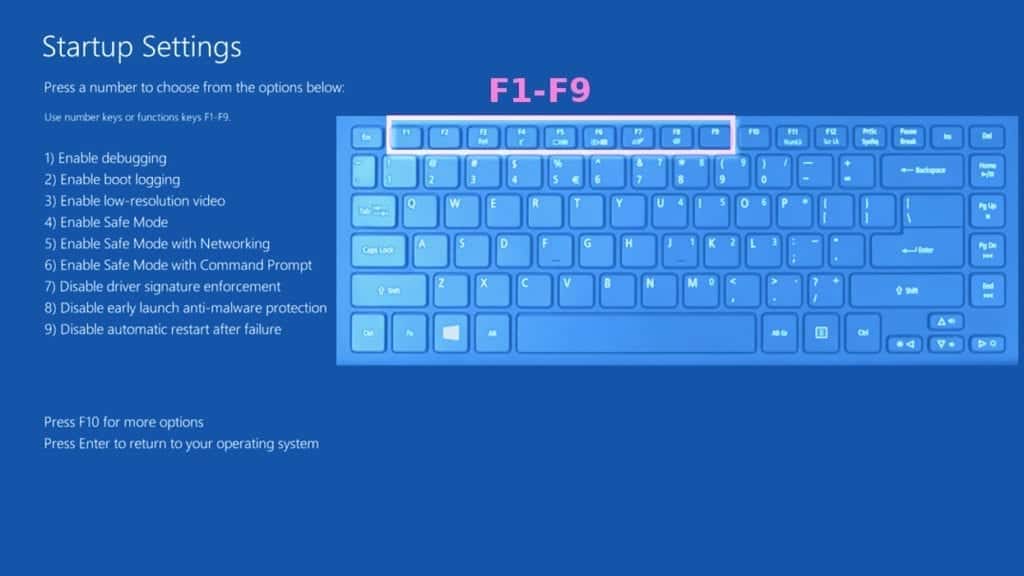
Step 2. Remove files associated with the virus
Now, you can search for and remove OGDO Ransomware Virus files. It is very hard to identify files and registry keys that belong to the ransomware virus, Besides, malware creators tend to rename and change them repeatedly. Therefore, the easiest way to uninstall such type of a computer virus is to use a reliable security program such as INTEGO Antivirus. For virus damage repair, consider using RESTORO.
Special Offer
Compatibility: Microsoft Windows
See Full Review
RESTORO is a unique PC Repair Tool which comes with an in-built Avira scan engine to detect and remove spyware/malware threats and uses a patented technology to repair virus damage. The software can repair damaged, missing or malfunctioning Windows OS files, corrupted DLLs, and more. The free version offers a scan that detects issues. To fix them, license key for the full software version must be purchased.
Method 2. Use System Restore
In order to use System Restore, you must have a system restore point, created either manually or automatically.
Step 1. Boot Windows in Safe Mode with Command Prompt
Instructions for Windows XP/Vista/7 users
- Shut down your PC. Start it again by pressing the Power button and instantly start pressing F8 button on your keyboard repeatedly in 1-second intervals. You will see Advanced Boot Options menu.
- Using arrow keys on the keyboard, navigate down to Safe Mode with Command Prompt option and press Enter.
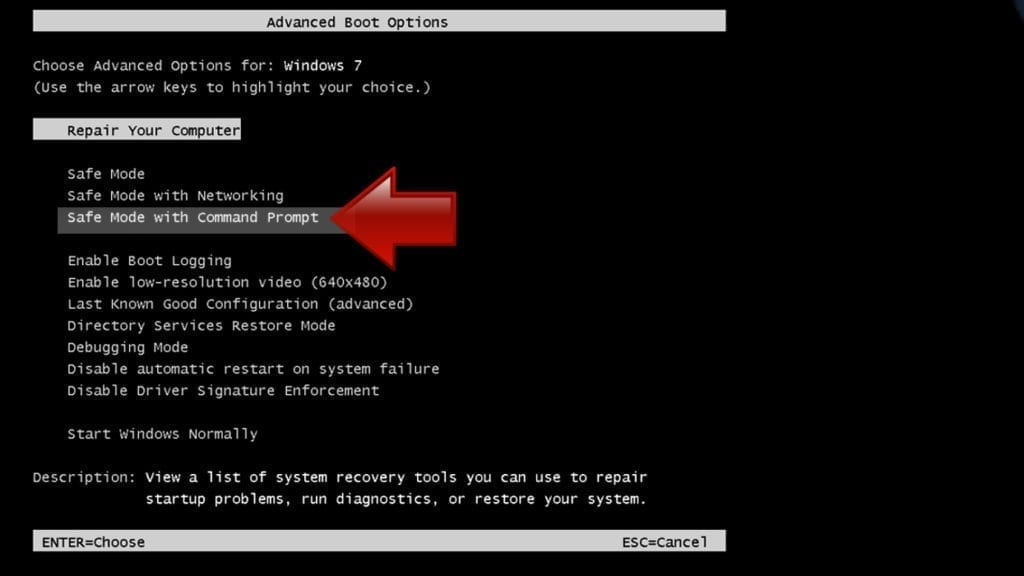
Instructions for Windows 8/8.1/10/11 users
- Launch Windows Start menu, then click the Power button. On your keyboard, press down and hold the Shift key, and then choose Restart option with the mouse cursor.

- This will take you to Windows Troubleshoot screen. Choose Troubleshoot > Advanced Options > Startup Settings > Restart. Tip: If you can't find Startup Settings, click See more recovery options.

- In Startup Settings, press the right key between F1-F9 to enter Safe Mode with Command Prompt. In this case, press F6 key.

Step 2. Start System Restore process
- Wait until system loads and command prompt shows up.
- Type cd restore and press Enter, then type rstrui.exe and press Enter. Or you can just type %systemroot%system32restorerstrui.exe in command prompt and hit Enter.
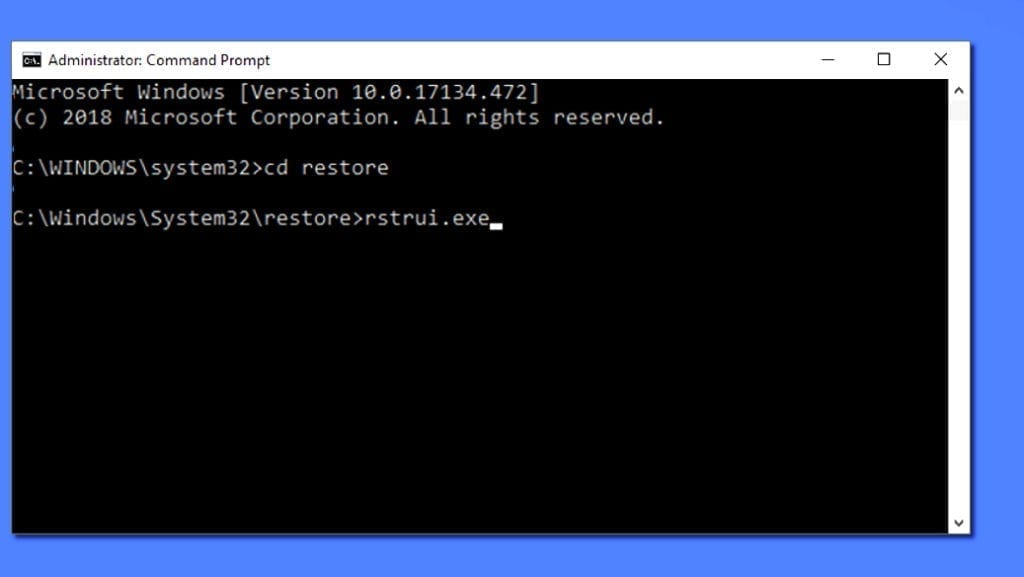
- This launches System Restore window. Click Next and then choose a System Restore point created in the past. Choose one that was created before ransomware infection.
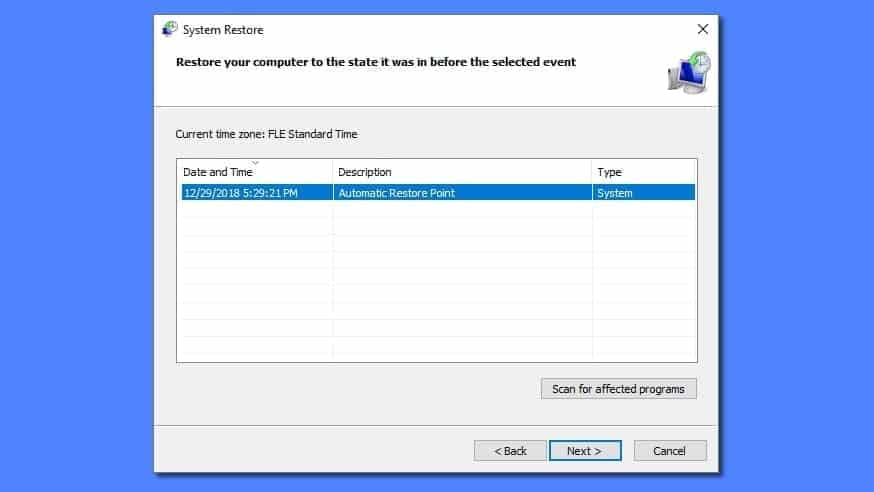
- Click Yes to begin the system restoration process.
After restoring the system, we recommend scanning the system with antivirus or anti-malware software. In most cases, there won't be any malware remains, but it never hurts to double-check. In addition, we highly recommend checking ransomware prevention guidelines provided by our experts in order to protect your PC against similar viruses in the future.
Alternative software recommendations
Malwarebytes Anti-Malware
Removing spyware and malware is one step towards cybersecurity. To protect yourself against ever-evolving threats, we strongly recommend purchasing a Premium version of Malwarebytes Anti-Malware, which provides security based on artificial intelligence and machine learning. Includes ransomware protection. See pricing options and protect yourself now.
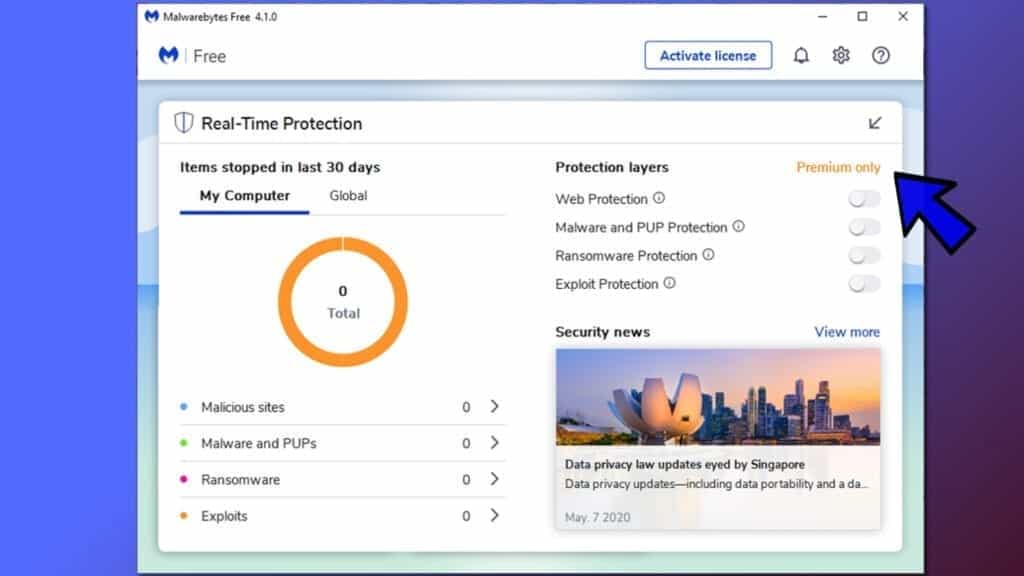
System Mechanic Ultimate Defense
If you're looking for an all-in-one system maintenance suite that has 7 core components providing powerful real-time protection, on-demand malware removal, system optimization, data recovery, password manager, online privacy protection and secure driver wiping technology. Therefore, due to its wide-range of capabilities, System Mechanic Ultimate Defense deserves Geek's Advice approval. Get it now for 50% off. You may also be interested in its full review.
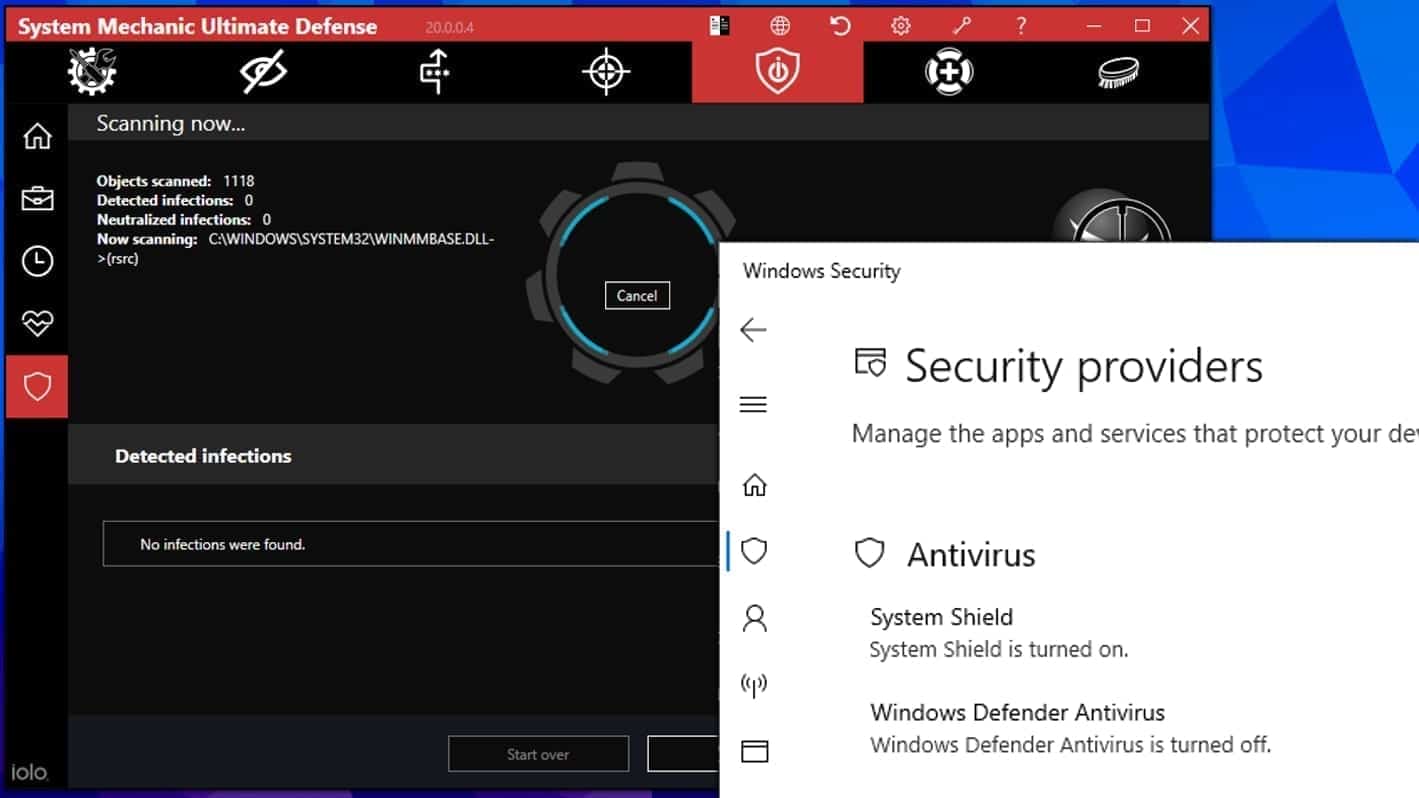
Disclaimer. This site includes affiliate links. We may earn a small commission by recommending certain products, at no additional cost for you. We only choose quality software and services to recommend.
Decrypt OGDO files
Fix and open large OGDO files easily:
It is reported that STOP/DJVU ransomware versions encrypt only the beginning 150 KB of each file to ensure that the virus manages to affect all files on the system. In some cases, the malicious program might skip some files at all. That said, we recommend testing this method on several big (>1GB) files first.
- Create a copy of encrypted file to a separate folder using Copy > Paste commands.
- Now, right-click the created copy and choose Rename. Select the OGDO extension and delete it. Press Enter to save changes.
- In the prompt asking whether you want to make the changes as file might become unusable, click OK.
- Try opening the file.
STOP/DJVU decryption tool usage guide
STOP/DJVU ransomware versions are grouped into old and new variants. OGDO Ransomware Virus is considered the new STOP/DJVU variant, just like KAAA, BGJS, BGZQ (find full list here). This means full data decryption is now possible only if you have been affected by offline encryption key. To decrypt your files, you will have to download Emsisoft Decryptor for STOP DJVU, a tool created and maintained by a genius security researcher Michael Gillespie.
Note! Please do not spam the security researcher with questions whether he can recover your files encrypted with online key - it is not possible.
In order to test the tool and see if it can decrypt OGDO files, follow the given tutorial.
- Download the decryption tool from Emsisoft.
- Click the little arrow next to your download and choose Show in Folder.
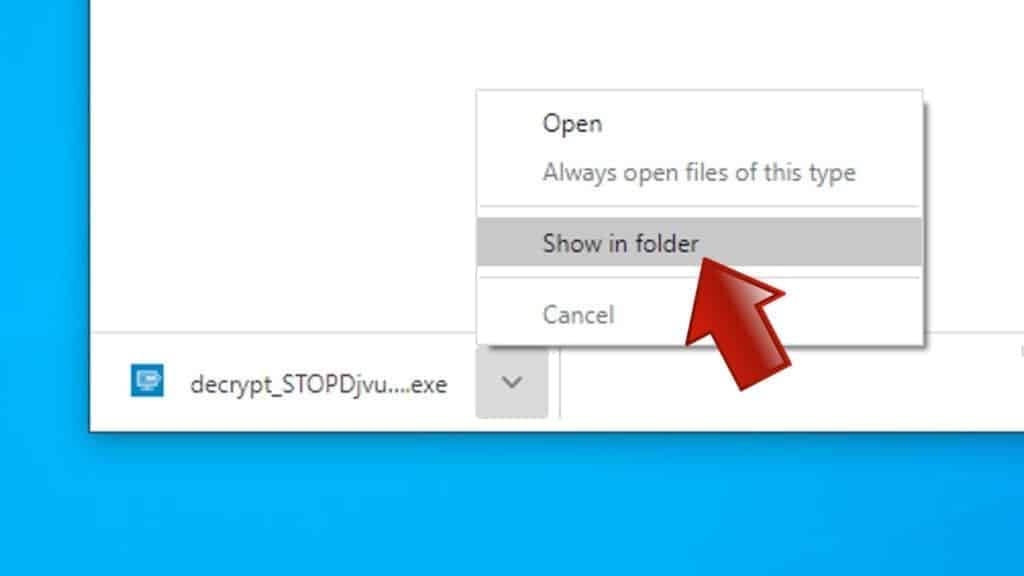
- Now, right-click the file and choose Run as Administrator. If asked, enter administrator's password.
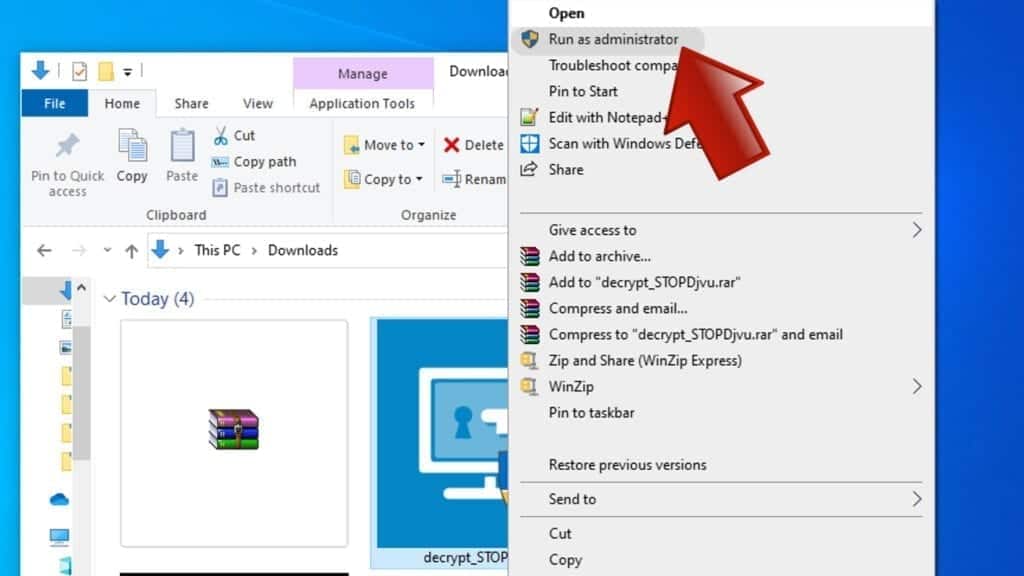
- In UAC window, click Yes.
- Click Yes to agree to software terms in both windows.
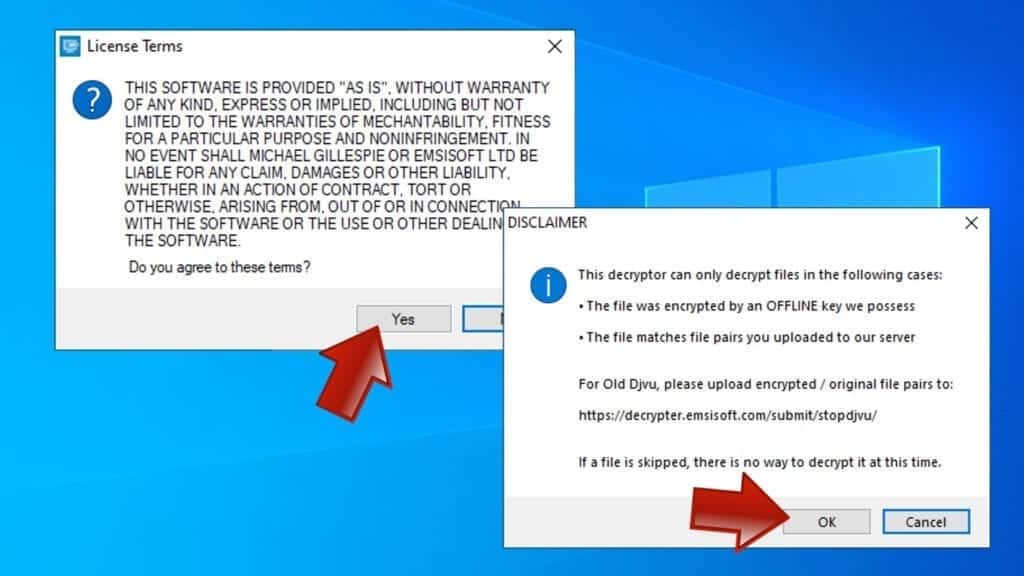
- The tool will automatically include C:// disk as a location to decrypt. The file recovery tool will prepopulate the locations to scan, including connected data storage drives or network drives. Click Add folder if you wish to add additional locations.
In Options tab, you can choose to keep encrypted file copies. We recommend leaving this option selected, especially if you do not know if the decryption tool will work.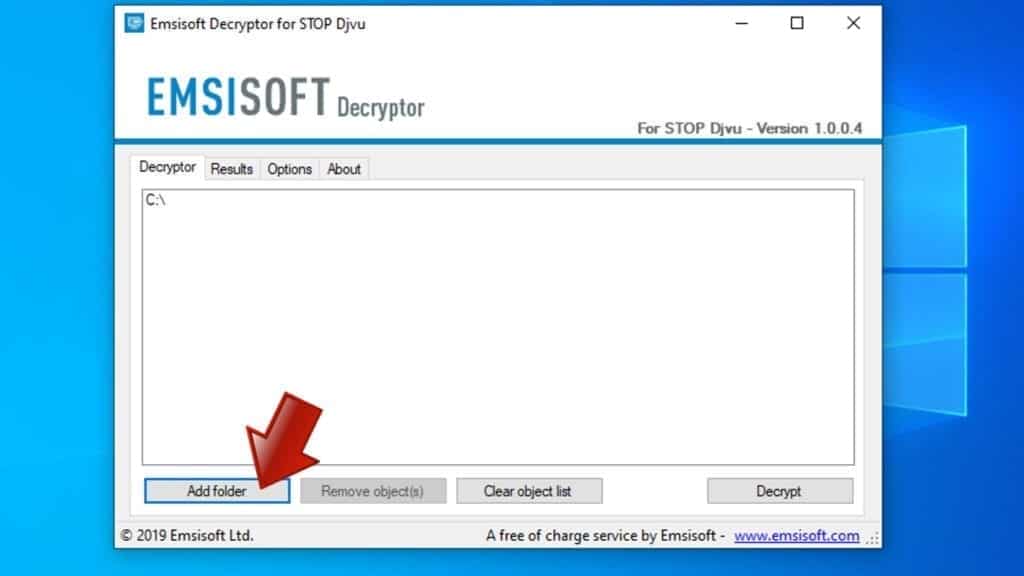
- Click Decrypt to start restoring OGDO files. You will see the progress in the Results tab. Here, you can see messages from the tool, such as whether the decryption procedure is successful, or you need to wait for an update.
You might also be informed that online key was used to encrypt your files. In such case, the decryption tool won't work for you, and the only way to recover your files is to use a data backup.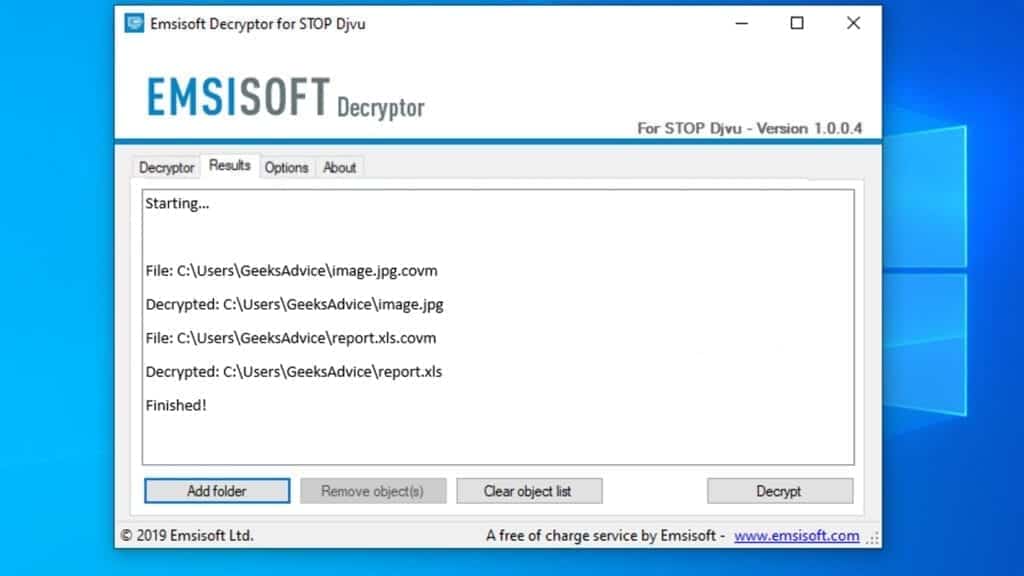
Meanings of decryptor's messages
The OGDO decryption tool might display several different messages after failed attempt to restore your files. You might receive one of the following messages:
Error: Unable to decrypt file with ID: [example ID]
This message typically means that there is no corresponding decryption key in the decryptor's database.
No key for New Variant online ID: [example ID]
Notice: this ID appears to be an online ID, decryption is impossible
This message informs that your files were encrypted with online key, meaning no one else has the same encryption/decryption key pair, therefore data recovery without paying the criminals is impossible.
Result: No key for new variant offline ID: [example ID]
This ID appears to be an offline ID. Decryption may be possible in the future.
If you were informed that an offline key was used, but files could not be restored, it means that the offline decryption key isn't available yet. However, receiving this message is extremely good news, meaning that it might be possible to restore your OGDO extension files in the future. It can take a few months until the decryption key gets found and uploaded to the decryptor. We recommend you to follow updates regarding the decryptable DJVU versions here. We strongly recommend backing up your encrypted data and waiting.
Report Internet crime to legal departments
Victims of OGDO Ransomware Virus should report the Internet crime incident to the official government fraud and scam website according to their country:
- In the United States, go to the On Guard Online website.
- In Australia, go to the SCAMwatch website.
- In Germany, go to the Bundesamt für Sicherheit in der Informationstechnik website.
- In Ireland, go to the An Garda Síochána website.
- In New Zealand, go to the Consumer Affairs Scams website.
- In the United Kingdom, go to the Action Fraud website.
- In Canada, go to the Canadian Anti-Fraud Centre.
- In India, go to Indian National Cybercrime Reporting Portal.
- In France, go to the Agence nationale de la sécurité des systèmes d’information.
If you can't find an authority corresponding to your location on this list, we recommend using any search engine to look up "[your country name] report cyber crime". This should lead you to the right authority website. We also recommend staying away from third-party crime report services that are often paid. It costs nothing to report Internet crime to official authorities.
Another recommendation is to contact your country's or region’s federal police or communications authority.
Frequently Asked Questions
You can only open OGDO files if you have the decryption key, or if you were affected by offline encryption type.
To figure out whether you were affected by offline encryption, please go to C:/SystemID/PersonalID.txt and see if the string inside of it ends in t1. You can also try using Emsisoft Decryptor for STOP/DJVU.
Please follow the guidances provided by the official OGDO decryption tools and believe what they say. If they say it is impossible to decrypt, it really is so. There is no magic tool or human capable of decrypting your files hiding somewhere. Encryption is a technique created to be nearly impossible to decrypt without a special private key (held by the criminals).
We advise scanning with anti-virus, anti-malware, malware removal tools or software like RESTORO to eliminate virus damage on the system. If you do not trust using a single tool, try running one after another. However, we do not recommend keeping several security programs on a computer at once as they can interfere with each other's work.
Beware of fake OGDO decryption tools circulating around the web. Cyber criminals are uploading them to various shady websites, also might be promoting them via suspicious Youtube videos. These programs can infect your computer even more heavily (Trojans, miners, etc.). We suggest being extremely cautious around the web. If there will be an official STOP/DJVU decryption tool available, it will be widely discussed in public media.

Norbert Webb is the head of Geek’s Advice team. He is the chief editor of the website who controls the quality of content published. The man also loves reading cybersecurity news, testing new software and sharing his insights on them. Norbert says that following his passion for information technology was one of the best decisions he has ever made. “I don’t feel like working while I’m doing something I love.” However, the geek has other interests, such as snowboarding and traveling.
Leave a Reply